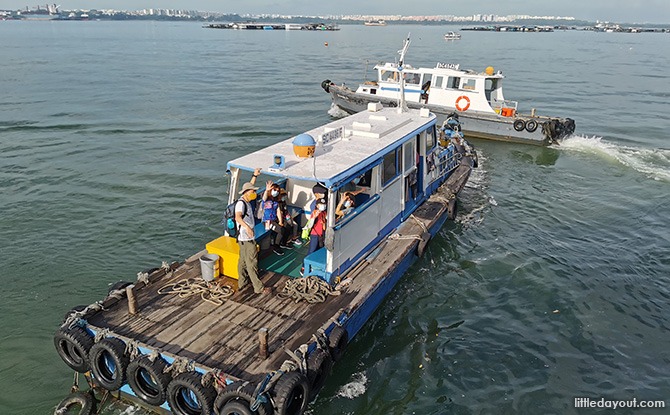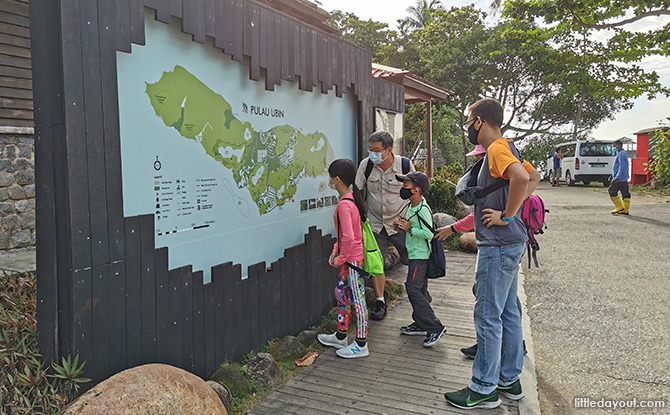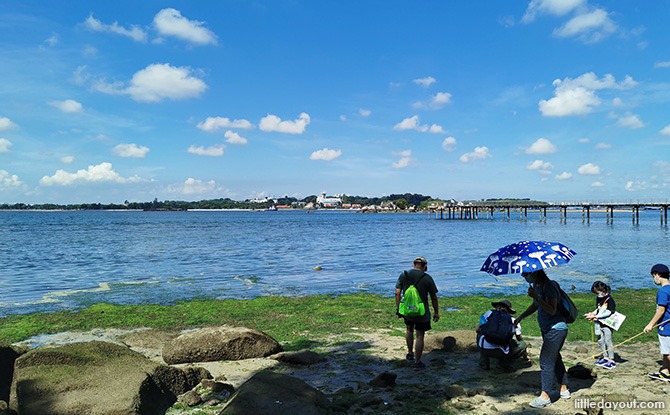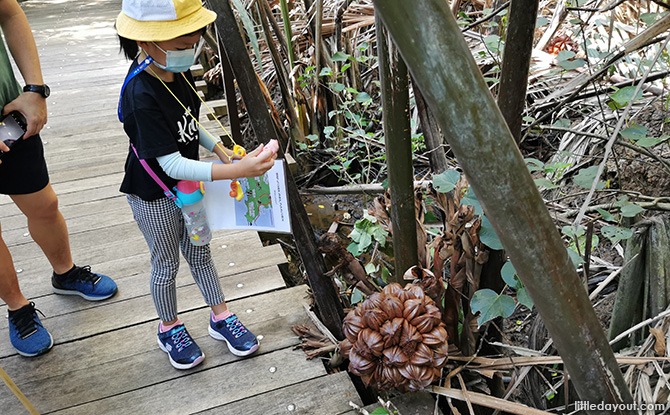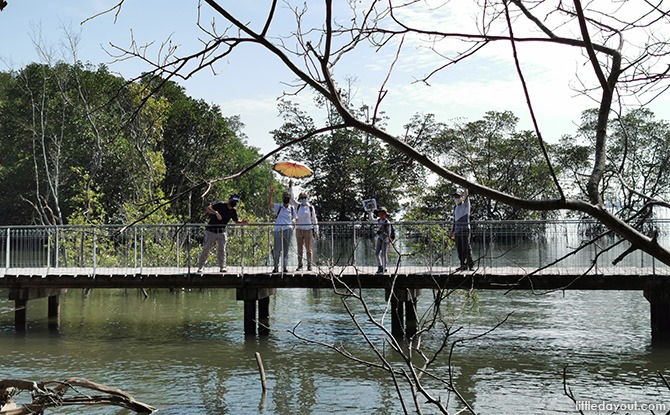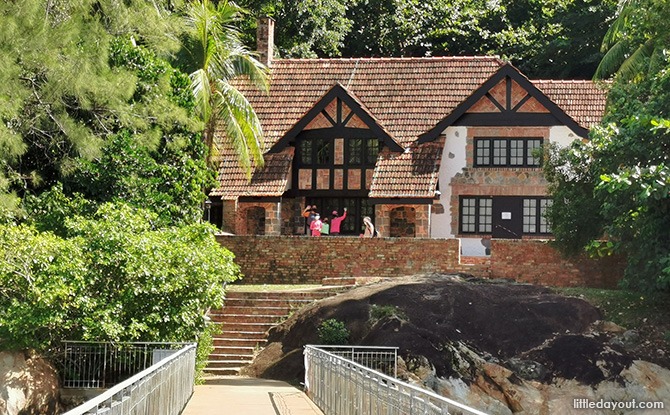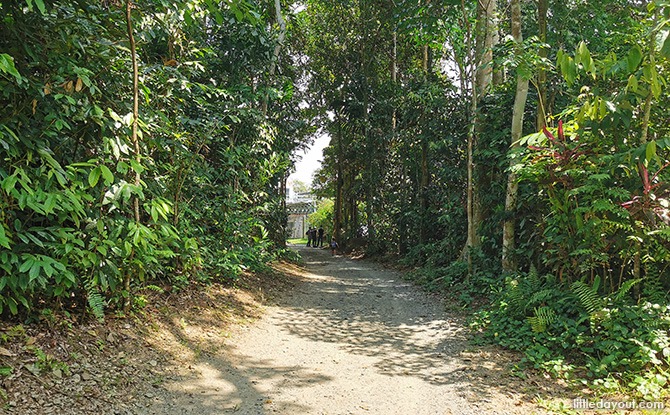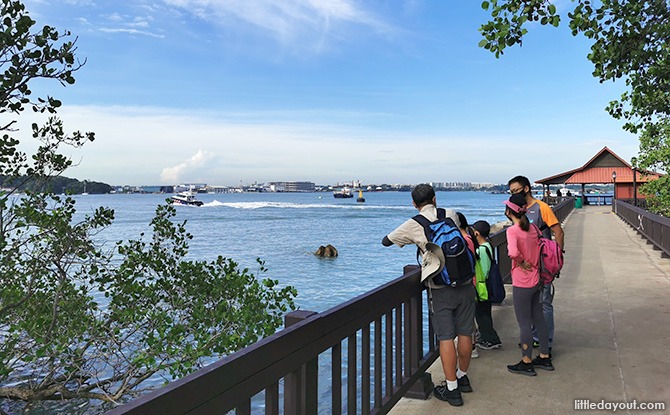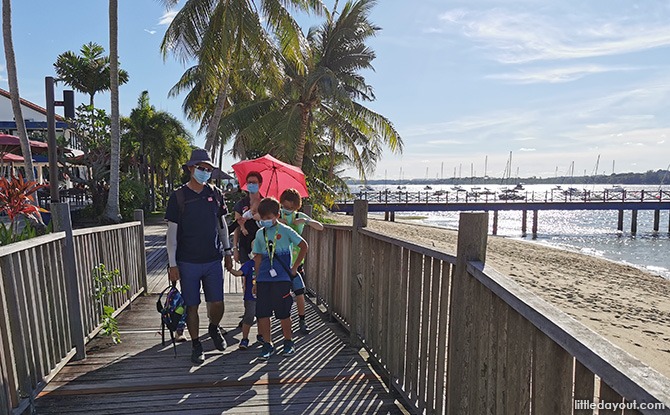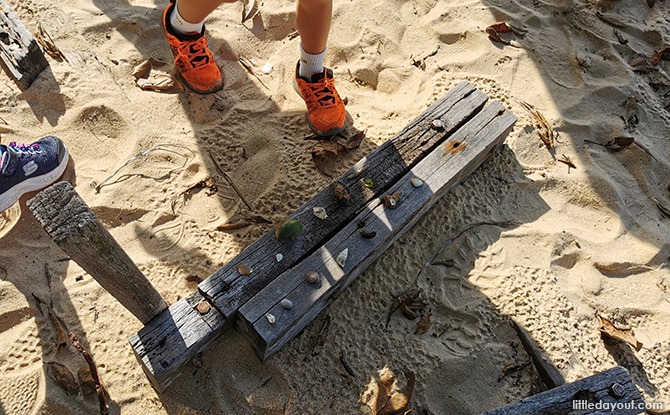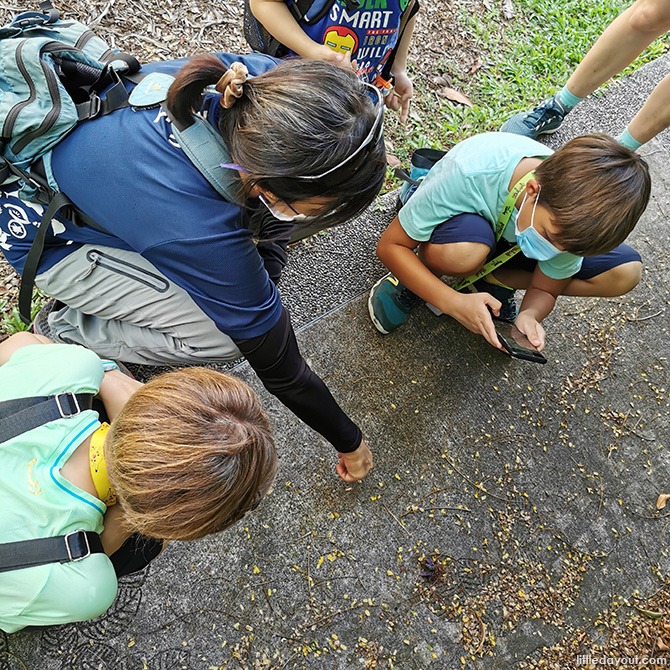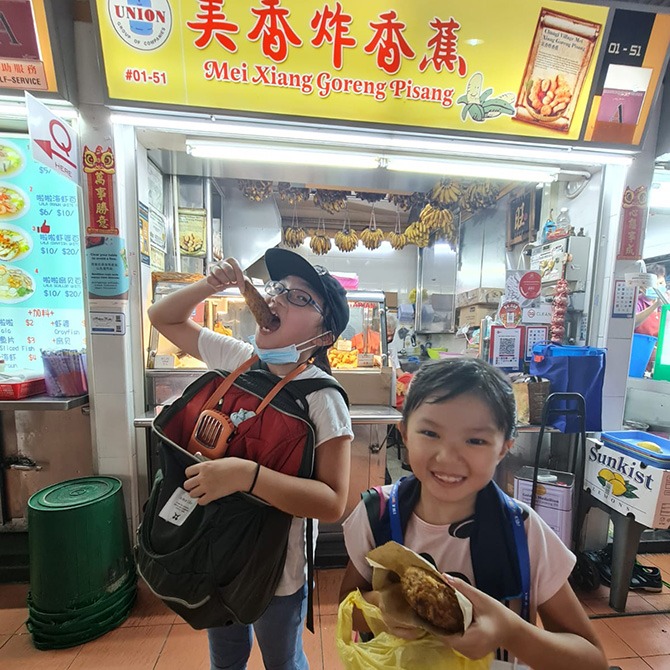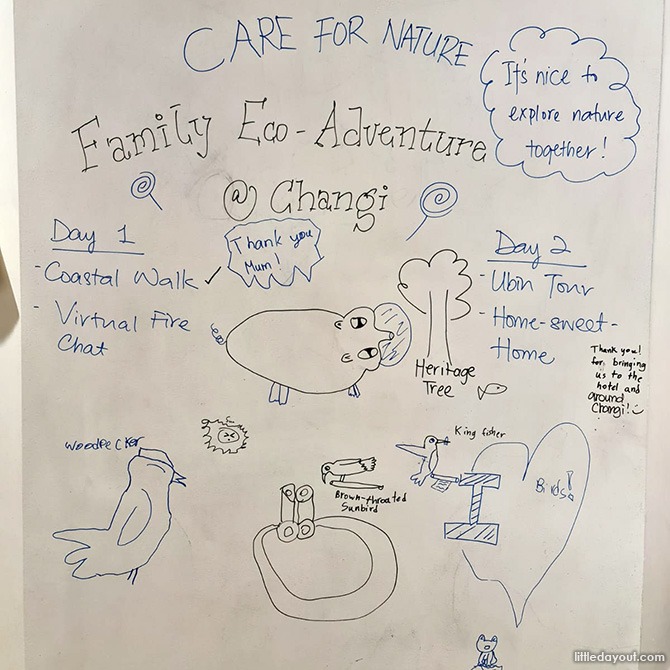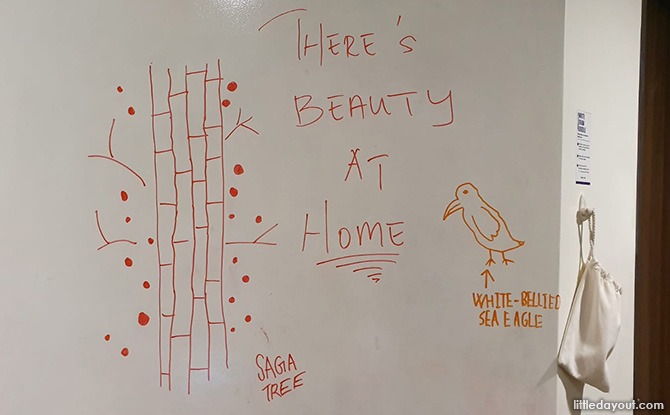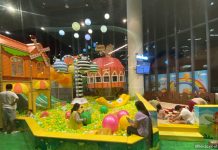School holidays mean more time for adventures with the family. Little Day Out’s Family Eco-Adventure @ Changi held during the second half of the June holidays was all about learning and going to less-trodden spots. Enthusiastic families joined us for customised guided nature walks at Pulau Ubin and Changi Coast within their family units in small groups of five. They even took on challenges such as a Scavenger Hunt at Changi Village. Everyone had a wonderful time soaking in the sights. We even had an 83-year-old and a one-year-old in our midst!
Nurturing the Love of Nature and Heritage in Families
The theme of the Eco-Adventure was all about our natural heritage. We ventured to Changi and Pulau Ubin for a walk based on the rustic places rich with historical and natural heritage. Our base was Changi Cove Singapore, where a restored colonial heritage building sits. It boasts the presence of two heritage trees – the Chinese Olive Tree at the entrance and Common Pulai Tree – each is more than a hundred years old!
A Day at Pulau Ubin
Pulau Ubin is Singapore’s third largest island and possibly the only area untouched by technology and progress. Stepping onto the island is like going back in time to Singapore in the ‘60s. Our Eco-Adventurers were delighted to take the bumboat to the island. In that 10 minutes, there was plenty to soak in. It was such a rare treat to “travel overseas”.
Year-end Holiday Camps: Discover Fun and Exciting Camps for Kids; Book Early
Dec Fun: Get the Best Ideas for the School Holidays
We could see the “pointing finger sculpture”, called the Inscription of the Island sculpture at Changi Point. The Changi Beach Playground was also in sight. We went by the Changi coast, saw kelongs, yachts and kayaks as we approached Pulau Ubin.
Our knowledgeable guides accompanied each family, regaling them with tales of the island, islanders’ life and the legend of how Pulau Ubin came to be. We then proceeded to the eastern point of Pulau Ubin – Chek Jawa – for a closer glimpse at the wildlife and the beautiful coast.
Chek Jawa’s Raw Beauty
Chek Jawa is a unique area where six ecosystems meet. It is a protected area for now, against any land reclamation projects, as it hosts possibly the richest biodiversity in Singapore. In my opinion, it is also the most scenic spot on our island especially at low tide.
Eco-Adventurers got a chance to see the signs left behind by the Malay Kampong that was there, ascended Jejawi Tower to get a bird’s eye view of the area, entered the Mangrove Boardwalk and the Coastal Walk.
Mangrove crabs, Tailor birds, Nipah Palm (where atap chee is from), Wild Pandan and Mud Lobster mounds were aplenty. Guides shared the importance of Mangrove Forests and its role as a critical habitat. We saw the Fiddler crabs with its enlarged orange pincer, Sand Bubbler crabs, heard the Pistol Shrimp and its “loud snapping sounds”. Thanks to the low tide, Eco-Adventurers saw plenty of carpet anemone, the seagrass habitat and herons fishing. Apart from the shore, we had a treat in the skies watching the White-bellied Sea Eagle, Terns and plenty of birds roosting in the canopy.
The rest stop was at House No. 1 where a Tudor style brick house stood majestically at the jetty. Across it was Frog Island, part of the legend of how the islands were formed. After the guided walk, we took in other sights of the island including Pekan Quarry, Ah Ma Drink Stall and Ubin Living Lab. We also saw the hornbill’s nesting boxes, specially built to help rehabilitate the population.
Sensory Trail at Pulau Ubin
After lunch, the Eco-Adventurers continued on their Pulau Ubin exploration with the Sensory Trail. Here, there are all kinds of herbs, fruit trees and crops that the Ubin Islanders used to grow. We saw a wide variety of fruits, vegetables and herbs.
What surprised me was how much they could grow, including Tea plants and Coffee trees. We saw Durian trees, Starfruit trees and Assam Gelugor trees, eye-openers for many of our families and their children.
Along the trail, we could hear the Magpie Robin singing in the foliage. We even ventured to a quiet beach where mudskippers can be spotted including nearby kelongs. The Sensory Trail led to a wild boar hangout – their mud pits! While we did see a family lingering in the area, it is best to avoid the mud pits.
The Sensory Trail then brought us to another Mangrove forest flanked by the tidal river where more wildlife were spotted. We reached a lotus pond where fish farms used to be. The lotuses were growing in abundance, thanks to the pig farm feed in the area. The slower pace of life experienced was a sharp contrast to our lives as city-dwellers. Even though the weather and terrain was out of the comfort zone for some Eco-Adventurers, they gamely soaked in the environment and cherished the learning opportunities.
Changi Coastal Boardwalk and Changi Village
The other highlight for the Eco-Adventure was the Changi Point Coastal Boardwalk. We set off from Changi Cove to see the heritage trees, hornbills feeding, different flowers and birds. Changi, interestingly, was named after the Chengai Tree that stood tall and significant. It was even used as a guidepost for the RSAF. However, this Chengai Tree was actually a Sepetir tree! It was chopped down by the Japanese during World War 2 unfortunately. The real Changi tree was the Hopea Sangal tree, a tree that has disappeared from our landscape but is being cultivated by NParks.
The Changi area used to be a military base with many government buildings for the British army. We still see some of the buildings today; the most prominent being Changi Hospital at the top of the hill. Granite from Pulau Ubin’s quarry was excavated for the Changi Railway many years ago. Changi was also a recreational area and the homes have since been converted into chalets for visitors.
Our guided walk brought us to the paths lined with heritage trees, and the coast overlooking Pulau Ubin. As the children gathered shells, peered at barnacles and examined their finds, we met anglers eager to catch some fish just as the terns flying around were fishing.
We passed by Changi Sailing Club, which has been a prominent place for sailing for decades. Many national sailors started their hobby turned sport here.
As we walked towards Changi Village, we could pick saga seeds and even admire the grand heritage trees. The raised wooden platforms we walked on helped protect the tree roots and also gave us space to walk around the trees, checking out the metal wires that protected the trees from any lightning strikes.
Trees are such important habitats – not just to the birds but to the squirrels, insects and reptiles. We saw the plantain squirrel and the changeable lizard in their natural habitat! The children took the chance to do some nature journaling. This helped them to remember what they saw, heard, smelt and touched.
We ended our journey with a Scavenger hunt at Changi Village which brought back fond memories of old school snacks, desserts, treats and of course prominent stalls selling nasi lemak and goreng pisang!
A Virtual Get-together on Zoom
To round everyone up as best as we could, we all gathered virtually via Zoom for some fun and games. We had a Kahoot quiz which tested our knowledge on the Changi and Pulau Ubin facts, and of course, learnt more lesser-known facts. Did you know that tigers used to prowl Pulau Ubin?
We had a family poster session, making use of the doodle walls at Changi Cove hotel. Each family presented what they learnt and saw, and precious lessons for the entire family to take home. It was a memorable Eco-Adventure which opened the eyes of the participants to the wonders of nature and also encouraged them to go on more family adventures in Singapore!
Quotes from Eco-Adventurers
“Excellent organization and very educational.”
“Thanks for organising this memorable ECO-ADVENTURE!”
“Great time for reflection and wonderful opportunity for a worthy family project.”
“I appreciated how the guides customised the EXPERIENCE according to the family.”
“The (children) loved the hands-on activities like picking up saga seeds, learning to ‘skip’ stones at the beach, smelling the plants and herbs.”
Till the next Family Eco-Adventure!
Good news! The next Eco-Adventure is back this Summer Holidays. This time, it’s a special 3-day programme with a kayaking adventure too! It will be held from 26 to 28 July 2021, Monday to Wednesday. Click here for more details and to register now!
For those would like to join us on our next eco-adventure, leave your details here and we will keep you in the loop for future events!


